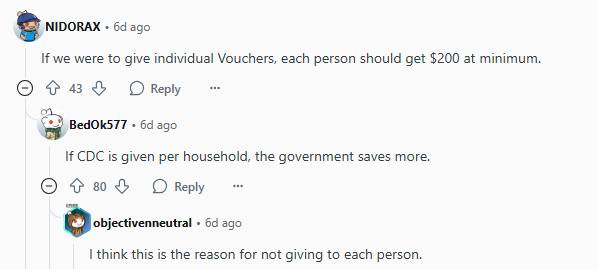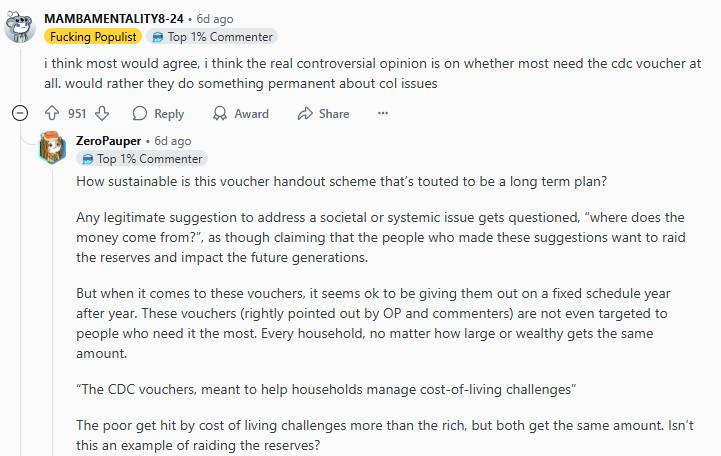SINGAPORE: As the latest S$500 Community Development Council (CDC) vouchers were rolled out to Singaporean households, a Reddit user’s post questioning the fairness of the distribution model sparked a discussion: Should the vouchers be allocated per person instead of per household?
Prime Minister Lawrence Wong announced the new tranche of CDC vouchers during a community event at Nee Soon South Community Club on 13 May 2025.
He reiterated that the vouchers are part of a broader, ongoing Government initiative to help Singaporeans cope with rising costs.
“This is not a one-off exercise,” he said.
“The Government will provide the help for as long as it is needed.”
Wong acknowledged concerns about sustainability but assured the public that Singapore’s fiscal strategy remains sound.
He attributed the country’s current financial strength to earlier decisions to raise taxes, stating that this placed Singapore in a good position to fund such support measures.
He added that the CDC vouchers are part of the evolving “Forward Singapore” roadmap and are not meant to be a standalone solution.
Each household is now entitled to S$500 worth of CDC vouchers—split evenly between heartland merchants and hawkers (S$250) and participating supermarkets (S$250).
The vouchers are valid until 31 December 2025, with another S$300 due in January 2026, bringing the total to S$800 for the financial year.
Redditor u/Dizzy_Boysenberry499 took to r/singapore on Wednesday (14 May) and expressed concerns over the household-based distribution of vouchers.
“I understand that there are many criticisms about CDC vouchers, some more valid than others,” they wrote.
“I can accept that CDC vouchers are in voucher form and not cash to ensure spending supports legitimate household expenses and local businesses. But what I cannot agree with is giving them per household instead of per person.”
The user highlighted that larger households are effectively penalised, as the per-capita value of vouchers decreases with more occupants.
“Imagine if a household has five people living at one address—they’re being punished because they get less voucher support per capita.”
They also pointed out contradictions in Government messaging.
“Isn’t the Government trying to encourage having children? I understand that a child under 18 may not need as much as an adult, but maybe we could have half the value for under-18s and full value for adults.”
The same commenter noted that multigenerational households who care for elderly parents are also disadvantaged.
“The Government wants to encourage people to care for their parents instead of putting them in old folks’ homes. Why are we punishing people who are doing so?”
Public Echoes Calls for Per-Capita Distribution
Many netizens supported the idea that vouchers should be distributed per person, arguing that it doesn’t make sense for households with more people to receive the same amount as those with fewer occupants.




One user commented, “Agree—bigger families should have a higher quantum, seeing that the primary purpose of this is to aid in cost of living (COL).”

Some suggested specific figures, “If we were to give individual vouchers, each person should get at least S$200.”
Others were more cynical, suggesting that the per-household model was chosen to reduce Government expenditure.
“Govt gives per household so they can save money, but still claim credit for giving money to help everyone in the country.”


Criticism of CDC Vouchers as “Superficial Fix”
A number of commenters questioned the effectiveness of CDC vouchers altogether, describing them as superficial or symbolic solutions that do little to resolve the deeper economic pressures.
One user remarked that vouchers are not even comparable to a band-aid, as at least a band-aid can stop bleeding and prevent infection.
Instead, they likened CDC vouchers to cheap alcohol—offering only temporary relief, like getting high and drunk for a night to forget the pain.
But by the next morning, they said, the wound remains—and is still bleeding.

Others criticised the reactive nature of Government aid.
“Most of these cost-of-living help schemes are like virus patch updates. You find a symptom, you fix the symptom. There’s not much anticipation or effort to go to the root cause.”

Another user commented, “Many tranches of CDC vouchers just sound absurd. It’s like managing symptoms instead of solving the actual problem.”

One suggested that addressing broader issues like business rental costs would be more effective.
“How about solving the out-of-control rental costs affecting store owners that make everything unaffordable?”

Calls for Systemic Change
A particularly pointed criticism questioned the decision to raise the Goods and Services Tax (GST) while simultaneously issuing vouchers.
“Why raise the GST, then give out vouchers? It’s like killing someone and apologising afterwards.”

Others proposed systemic changes, such as linking CDC funding to broader wage reforms.
One suggestion was to scrap the voucher scheme entirely and instead mandate a minimum wage increase that keeps pace with inflation.
The commenter argued that the funds used for CDC vouchers could be redirected to subsidise companies that hire local workers, have local leadership, and are based in Singapore.
If wages rose in line with inflation, they added, there would be far less need for such temporary assistance.

One user remarked that while many people likely support the CDC voucher scheme in general, the more controversial question is whether most Singaporeans actually need the vouchers at all.
They suggested that a more permanent solution to cost-of-living (COL) issues would be preferable.
Another user questioned the long-term sustainability of the CDC voucher scheme, noting that calls for systemic reforms are often met with concerns about depleting national reserves—yet similar scrutiny isn’t applied to recurring voucher handouts.
They also pointed out that the vouchers are not well-targeted, as all households receive the same amount regardless of size or income.
This uniform distribution, they argued, may be just as much a case of “raiding the reserves” as any other proposed reform.

The post ‘Per person, not per household’: Reddit user critiques CDC voucher scheme as inequitable appeared first on The Online Citizen.


